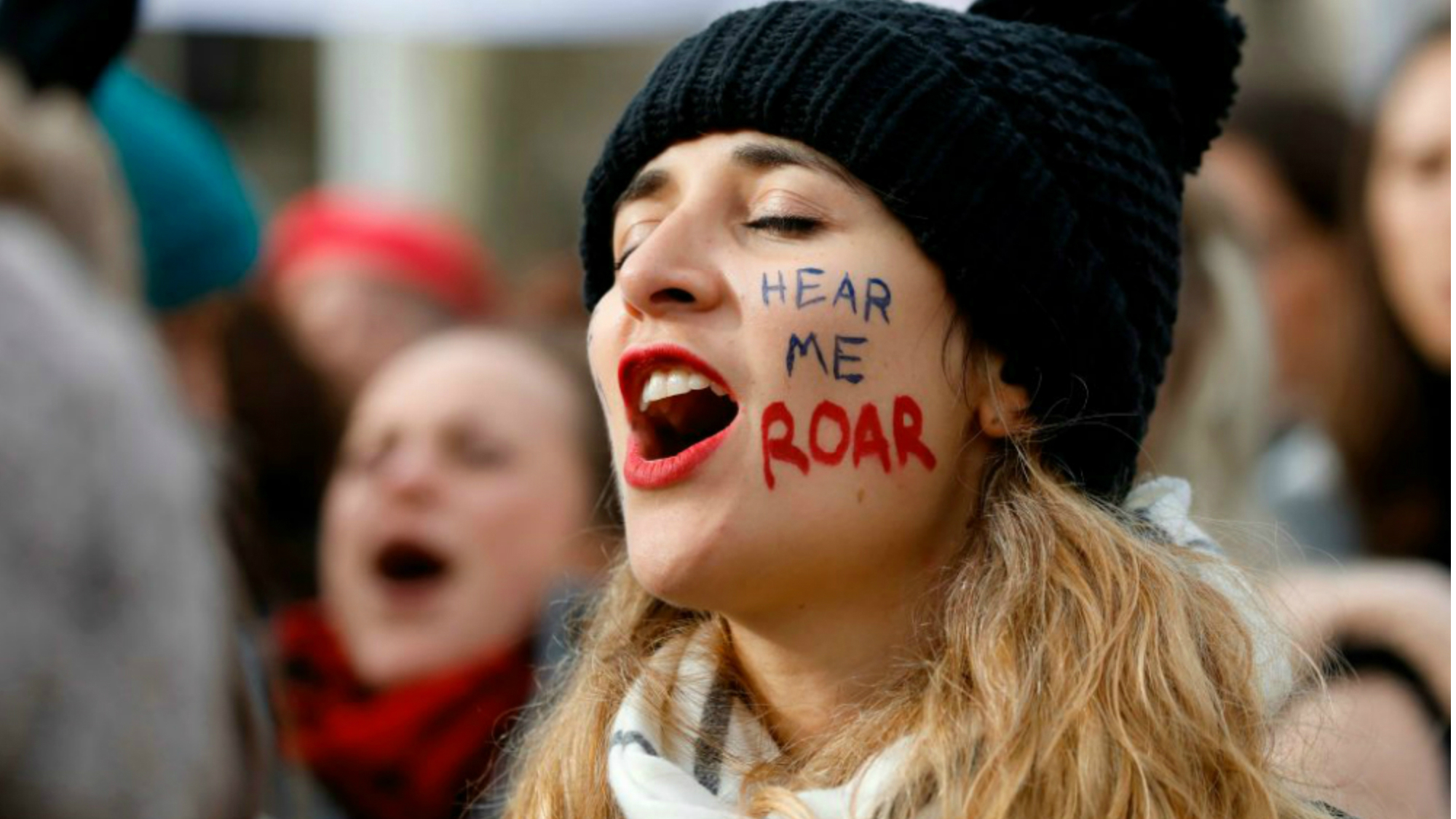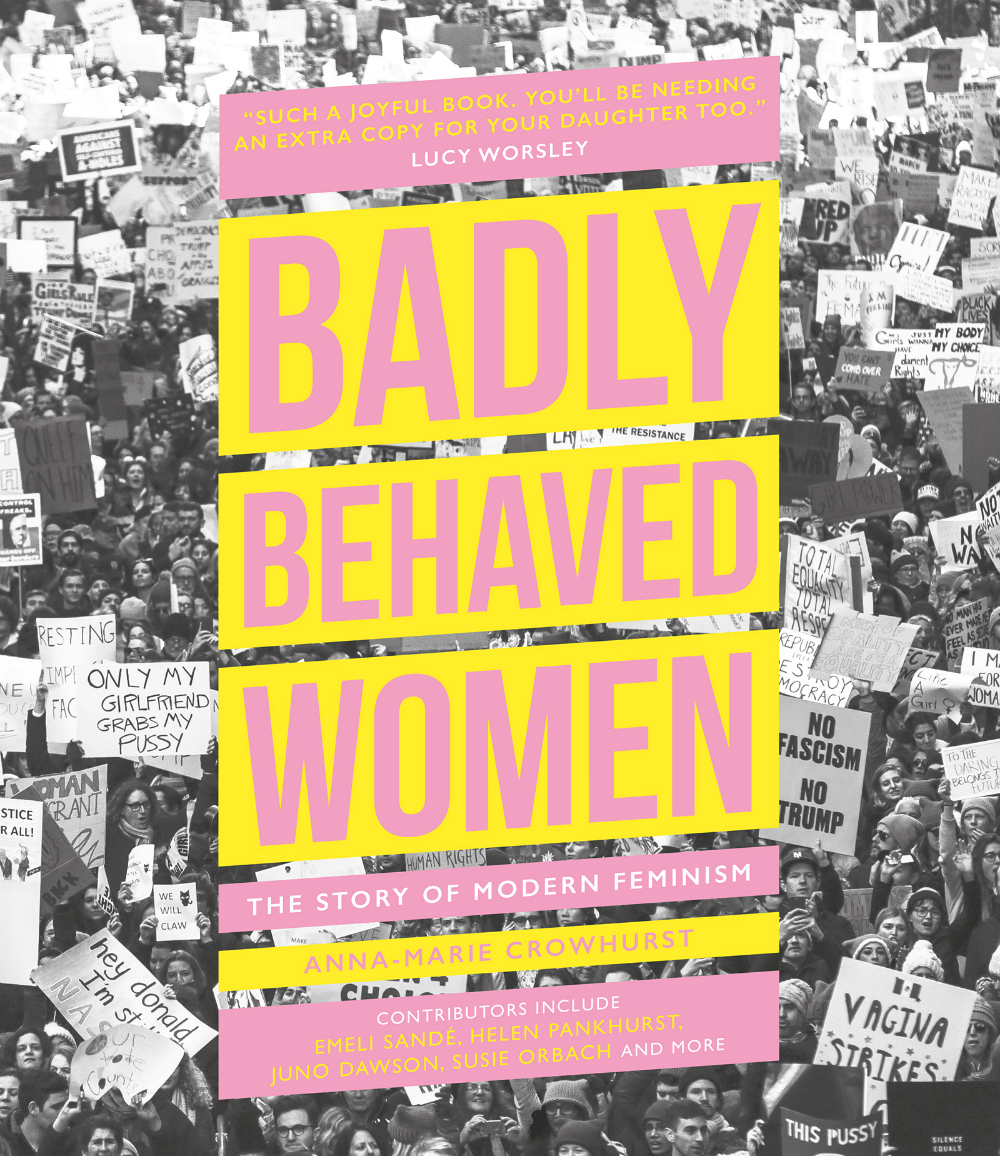This International Women's Day, we ask why feminism is still making people angry
From suffragettes to the politics of #MeToo, Anna-Marie Crowhurst celebrates 21st century activism reclaimed by a new generation, but asks: why are some people still so upset about equality for women?


From suffragettes to the politics of #MeToo, Anna-Marie Crowhurst celebrates 21st century activism reclaimed by a new generation, but asks: why are some people still so upset about equality for women?
When people ask you what you do for a living, does your answer make people angry? Recently I discovered that what I do does. Now being a writer - the question people ask next. ‘What are you writing?’ My new book, Badly Behaved Women, is a cultural history of modern feminism. Yet I discovered invoking that word, 'feminism' makes some people angry. Why? Why does feminism still make people angry?
Celebrating the women's movement, my book encompasses groovy feminist artists and fearless filmmakers; period pride and pay gap protests; #MeToo and #BlackGirlMagic, Riot Grrrl and Beyoncé. I loved writing it - researching the strides feminists made towards equality - and their powerful expressions of dissent.
It's inspirational and life-affirming to hear what amazing women have to say about feminism today - from Emeli Sandé and Helen Pankhurst to Juno Dawson and Diana Evans. And it's been a privilege to learn the stories of important feminists from the past.

The angry people
On a working holiday recently, a woman asked what I was writing. 'A book about feminism' instantly affected her. She bristled as if I’d said something distasteful. Feminism.
'Oh,’ the woman replied. She then hunched up her shoulders. Her eyes narrowed. And then: ‘It's gone too far, hasn't it? Why don't women want to be feminine? In my day, you enjoyed compliments from men. Now no one can say anything!'
Sigh. I tried to explain. ‘Actually, my book’s a history of everything feminists have achieved!’ Before realising I was wasting. My. Time.
Celebrity news, beauty, fashion advice, and fascinating features, delivered straight to your inbox!
'I just don't understand why women want to be better than men,' said a visibly agitated male relative. 'People should be equal - but the thing with feminism - what is it about putting men down?'
Answer: Again, not what feminism or the book is about. URRRGH.
We all know ‘angry feminist’ is used to denigrate. Black feminists particularly are critiqued and stereotyped as ‘angry’. It’s also the first thing trolls turn to when criticising on social media.
The first feminists
The first feminists - the suffragists - got called angry, too. Especially when their ‘Deeds Not Words’ campaign saw some of them smashing shop windows and setting fire to pillar boxes. This was desperation, really, because at that point, no one was listening.
When the suffragists began campaigning they provoked great anger. Why? Because women were only seen as wives and mothers, it was men who went to work and held political power. Anger towards the suffragists translated into violence, prison sentences, force feeding and public shaming.

Since then almost everything feminists have done has made some people angry. The women’s liberation movement was an enormous cultural revolution inciting widespread social change. It was 1968 and women were starting to break out of their unfulfilling pointy-bra-ed lives as housewives.
Fear of change
The second wave feminists wanted equal pay, workplace equality, free contraception, legal abortion and free childcare. The dream was equality. But the reality was people angry at women stepping out of line. Newspaper headlines made them sound crazed, violent, outrageous and reported bra burnings that never happened.
Anger towards feminism isn’t just about fear of change. I know misunderstandings about feminism are at the heart of these personal experiences. Probably because feminism is such a broad church, while some of the more extreme aspects of feminism are the ones reported and sensationalised. Misandry and feminism get confused. Ideas about navigating male-female relationships get muddled.
I'm proud to call myself a feminist, documenting over 120 years of feminist achievement. Writing about the suffragists, the Greenham Common campers, the ‘wolf pack’ protestors, and the Women’s March-ers makes me realise dissent is essential for change. To create change big things have to happen. And that might make some people angry. Tough.
Badly Behaved Women: The Story of Modern Feminism by Anna-Marie Crowhurst (£20, hardback format) is out now.
Maria Coole is a contributing editor on Marie Claire.
Hello Marie Claire readers – you have reached your daily destination. I really hope you’re enjoying our reads and I'm very interested to know what you shared, liked and didn’t like (gah, it happens) by emailing me at: [email protected]
But if you fancy finding out who you’re venting to then let me tell you I’m the one on the team that remembers the Spice Girls the first time round. I confidently predicted they’d be a one-hit wonder in the pages of Bliss magazine where I was deputy editor through the second half of the 90s. Having soundly killed any career ambitions in music journalism I’ve managed to keep myself in glow-boosting moisturisers and theatre tickets with a centuries-spanning career in journalism.
Yes, predating t’internet, when 'I’ll fax you' was grunted down a phone with a cord attached to it; when Glastonbury was still accessible by casually going under or over a flimsy fence; when gatecrashing a Foo Fighters aftershow party was easy-peasy-lemon-squeezy and tapping Dave Grohl on the shoulder was... oh sorry I like to ramble.
Originally born and bred in that there Welsh seaside town kindly given a new lease of life by Gavin & Stacey, I started out as a junior writer for the Girl Guides and eventually earned enough Brownie points to move on and have a blast as deputy editor of Bliss, New Woman and editor of People newspaper magazine. I was on the launch team of Look in 2007 - where I stuck around as deputy editor and acting editor for almost ten years - shaping a magazine and website at the forefront of body positivity, mental wellbeing and empowering features. More recently, I’ve been Closer executive editor, assistant editor at the Financial Times’s How To Spend It (yes thanks, no probs with that life skill) and now I’m making my inner fangirl’s dream come true by working on this agenda-setting brand, the one that inspired me to become a journalist when Marie Claire launched back in 1988.
I’m a theatre addict, lover of Marvel franchises, most hard cheeses, all types of trees, half-price Itsu, cats, Dr Who, cherry tomatoes, Curly-Wurly, cats, blueberries, cats, boiled eggs, cats, maxi dresses, cats, Adidas shelltops, cats and their kittens. I’ve never knowingly operated any household white goods and once served Ripples as a main course. And finally, always remember what the late great Nora Ephron said, ‘Everything is copy.’
